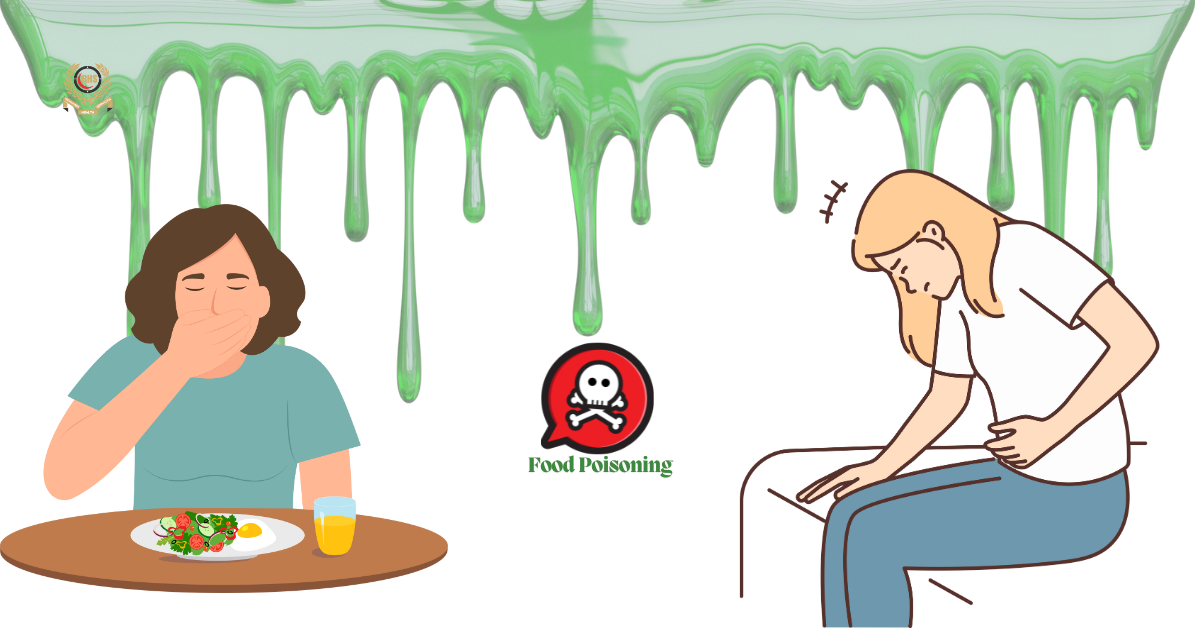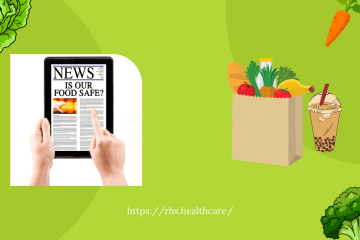Food Poisoning: Imagine savoring your favorite meal, only to be hit hours later with crippling stomach pain, nausea, or worse. This is the harsh reality of food poisoning a silent yet widespread health threat that affects millions worldwide. Whether it’s a poorly handled salad, undercooked meat, or contaminated water, food poisoning doesn’t discriminate, sneaking into our lives through the most unsuspecting meals. The good news? You can protect yourself and your loved ones by learning the causes, symptoms, and preventive measures.
In this comprehensive guide, we’ll uncover the hidden dangers of food poisoning and equip you with the tools to enjoy your meals without fear. Let’s dive into safeguarding your health against this all-too-common foe.
What is Food Poisoning Understanding the Basics
Food poisoning occurs when harmful pathogens such as bacteria, viruses, parasites, or their toxins contaminate the food or beverages we consume. These pathogens thrive in improperly handled, stored, or cooked food, leading to illness. The severity of food poisoning can vary based on the individual’s health, age, and the type of contaminant.
The Science Behind Food Poisoning
Understanding how food poisoning occurs involves examining the interaction between the pathogen and the host. Pathogens contaminate food through various pathways, including:
- Environmental Exposure: Contamination during farming, harvesting, or processing.
- Improper Handling: Cross-contamination in kitchens or food preparation areas.
- Inadequate Storage: Allowing food to sit at unsafe temperatures fosters pathogen growth.
These factors lead to the ingestion of harmful microorganisms, which trigger an immune response in the body and result in symptoms of food pos.
Common Causes of Food Poisoning
Food poisoning has multiple causes, categorized based on the type of pathogen or toxin involved
1. Bacterial Contamination
- Salmonella: Found in undercooked poultry, raw eggs, and contaminated vegetables.
- E. coli: Often linked to undercooked ground beef, unpasteurized milk, and contaminated water.
- Listeria monocytogenes: Common in deli meats, hot dogs, and unpasteurized dairy products.
Clostridium perfringens: Found in improperly stored cooked foods, such as casseroles or stews.
2. Viral Contamination
- Norovirus: Known as the “stomach flu,” it spreads rapidly through contaminated food or water and close contact with infected individuals.
- Hepatitis A: Often linked to eating raw or undercooked shellfish or food handled by infected individuals.
3. Parasitic Infestation
- Toxoplasma gondii: Frequently present in undercooked pork, lamb, or contaminated produce.
- Giardia: Associated with drinking untreated water from lakes, streams, or wells.
4. Chemical Contaminants and Toxins
- Botulinum Toxin: Produced by Clostridium botulinum in improperly canned or preserved foods.
- Mycotoxins: Found in moldy grains or nuts.
- Pesticide Residues: Leftover chemicals on unwashed produce.
Recognizing the Symptoms of Food Poisoning

Food poisoning symptoms often mimic other gastrointestinal issues, making it essential to recognize patterns specific to contaminated food consumption. Here’s a breakdown of symptoms based on pathogen types:
1. General Gastrointestinal Symptoms
- Nausea and vomiting
- Abdominal pain and cramping
- Diarrhea (watery or bloody)
2. Systemic Symptoms
- Fever and chills
- Fatigue and muscle weakness
- Headaches and body aches
3. Neurological Symptoms (Severe Cases)
- Blurred vision or slurred speech
- Difficulty swallowing or breathing
- Muscle paralysis (in cases of botulism)
When to Seek Emergency Care
- Symptoms persist beyond three days.
- Blood in vomit or stools.
- Severe dehydration with symptoms like sunken eyes, reduced urination, or confusion.
Diagnosing Food Poisoning
Diagnosing food poisoning involves clinical evaluation and laboratory tests. The process typically includes:
- Medical History Review: Examining dietary habits and recent travel history.
- Physical Examination: Identifying dehydration or abdominal tenderness.
- Laboratory Tests: Stool or blood tests to detect the specific pathogen.
- Imaging Studies: Rarely required but used to investigate complications like intestinal blockages.
How to Treat Food Poisoning at Home and Medically
1. Home Remedies
- Hydration: Drink plenty of water, herbal teas, or electrolyte-rich beverages.
- Bland Diet: Consume easily digestible foods like bananas, rice, applesauce, and toast (BRAT diet).
- Natural Remedies:
- Ginger tea for nausea relief.
- Peppermint tea to soothe stomach cramps.
2. Over-the-Counter Treatments
- Rehydration Solutions: Oral Rehydration Salts (ORS) are effective for combating dehydration.
- Anti-diarrheal Medications: Use with caution to avoid prolonging infection in cases of bacterial food contamination.
3. Medical Interventions
- Antibiotics: Prescribed for bacterial infections such as salmonella or shigella.
- Antiparasitic Drugs: Used for treating parasitic infections like giardiasis.
- Hospitalization: Required in severe cases for IV fluids and monitoring.
Preventing Food Poisoning: Key Strategies
Prevention is the most effective approach to combating foodborne illnesses. Follow these guidelines to minimize risk:
1. Safe Food Storage
- Store perishable items at temperatures below 40°F (4°C).
- Use airtight containers to prevent contamination.
2. Proper Food Preparation
- Wash hands and surfaces thoroughly before cooking.
- Use separate cutting boards for raw meat and vegetables.
- Cook food to the recommended internal temperatures:
- Poultry: 165°F (74°C)
- Ground meats: 160°F (71°C)
- Fish: 145°F (63°C)
3. Avoid Risky Foods
- Refrain from consuming raw or undercooked seafood, eggs, and meat.
- Opt for pasteurized dairy products and juices.
4. Practice Food Safety When Eating Out
- Choose reputable restaurants.
- Avoid buffets with improperly maintained temperatures.
Long-Term Effects of Food Poisoning
While most recover within a few days, food poisoning can lead to complications, particularly in vulnerable populations. These include:
- Chronic Gastrointestinal Disorders: Such as irritable bowel syndrome (IBS).
- Kidney Failure: Linked to severe E. coli infections.
- Neurological Disorders: Rarely, toxins can cause nerve damage or paralysis.
Impact of Food Poisoning on Public Health
Foodborne illnesses represent a significant burden on healthcare systems. Public health organizations play a vital role in:
- Tracking Outbreaks: Identifying sources to contain spread.
- Educating the Public: Promoting food safety awareness campaigns.
- Regulating Food Standards: Ensuring compliance with hygiene and safety protocols.
Cultural and Social Aspects of Food Safety
Traditional Practices
Many cultures have unique food preparation methods that may increase or decrease food poisoning risks. For instance:
- Fermented foods may introduce beneficial bacteria.
- Raw or semi-cooked dishes like sushi require stringent quality checks.
Modern Trends
- The rise of food delivery apps has increased the risks of improper handling.
- Farm-to-table dining emphasizes locally sourced, minimally processed food, often reducing contamination risks.
Steps to Recover Fully from Food Poisoning
Recovery involves more than symptom relief; it’s about rebuilding strength and preventing recurrence:
- Hydration: Continue ORS even after symptoms subside.
- Balanced Diet: Gradually reintroduce fiber-rich and protein-rich foods.
Probiotics: Support gut health with yogurt or supplements.
Conclusion: Protect Yourself from Foodborne Illnesses
Food poisoning is a preventable health issue that requires vigilance in food handling, preparation, and storage. By adopting safe food practices and staying informed about symptoms and treatments, you can significantly reduce the risk of illness. Share this knowledge with others to promote a healthier community.
FAQs:
1. What are the first signs of food poisoning?
The initial signs of food poisoning typically appear within hours to a few days after consuming contaminated food or drinks. Common early symptoms include:
- Nausea
- Vomiting
- Abdominal cramps or pain
- Diarrhea
- Fever (in some cases)
These symptoms may vary depending on the type of contaminant and the individual’s immune response.
2. How to relieve food poisoning pains?
To ease the discomfort caused by food poisoning, follow these tips:
- Stay Hydrated: Sip water, clear broths, or oral rehydration solutions to replace lost fluids.
- Apply Heat: Use a heating pad or warm compress on your abdomen to soothe cramps.
- Rest: Allow your body to recover by getting adequate rest.
- Consume Ginger Tea: Ginger is a natural remedy that can reduce nausea and stomach pain.
Stick to a Bland Diet: Foods like bananas, rice, applesauce, and toast (BRAT diet) are gentle on the stomach.
If symptoms persist or worsen, seek medical advice promptly.
3. What medicine helps with food poisoning?
Several medications can help alleviate symptoms of food pos, depending on their severity:
- Antiemetics (e.g., ondansetron): To reduce nausea and vomiting.
- Antidiarrheal Drugs (e.g., loperamide): To manage diarrhea (only after consulting a doctor).
- Antibiotics: Prescribed for bacterial infections like salmonella or shigella (not suitable for all cases).
Probiotics: To restore healthy gut bacteria.
Consult a healthcare professional before taking any medication, especially if you suspect severe food poisoning.
4. How long will food poisoning last?
The duration of food poisoning varies depending on the contaminant and the individual’s health. In most cases:
- Mild Cases: Symptoms resolve within 1-3 days.
- Moderate Cases: Recovery may take up to a week.
Severe Cases: Some complications can prolong recovery, requiring medical intervention.
If symptoms persist beyond a week or worsen, seek medical attention immediately.
5. What is the fastest way to flush out food poisoning?
To help your body flush out foodborne toxins and recover quickly, follow these steps:
- Drink Plenty of Fluids: Water, herbal teas, and electrolyte-rich drinks are essential.
- Consume Activated Charcoal: This may help bind toxins in mild cases (consult a doctor first).
- Eat Light: Avoid heavy, greasy, or spicy foods. Stick to bland, easy-to-digest meals.
- Rest: Give your immune system the energy it needs to fight off the infection.
Avoid self-medication or rushing the process; let your body recover naturally.
Stay safe, stay informed, and take control of your food safety journey.


